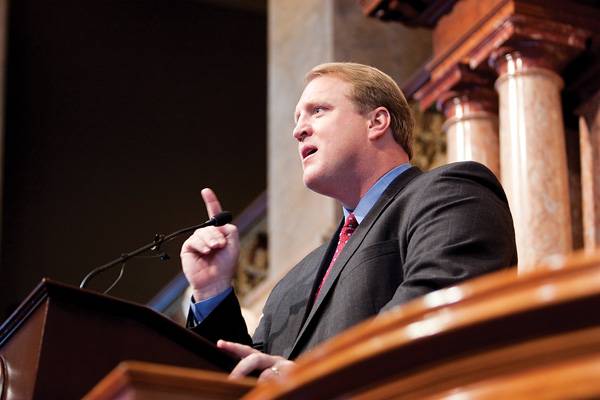Culver unveils state budget proposal

Gov. Chet Culver called the state of Iowa “strong” during his Condition of the State address on Tuesday, Jan. 13, 2009 at the Iowa Statehouse in Des Moines. Culver called on the state legislature to allocate $700 million for disaster relief across Iowa. Photo: Ross Boettcher/Iowa State Daily
January 28, 2009
Gov. Chet Culver unveiled his state budget proposal of $6.21 billion for the next fiscal year — a 1.4 percent decrease from the current fiscal year and a 6.5 percent cut for most state programs.
The budget proposal cuts spending by $88.5 million compared to this year and makes state layoffs likely.
“This is not a game. We’re doing what we have to do by law to balance the budget,” he said at a press conference Wednesday. “Significant layoffs are very likely any time you cut $580 million out of a budget.”
The governor said some agencies, such as workforce development, corrections and public safety, disaster relief and teacher pay would be immune from the 6.5 percent budget cut. Seven accounts separate from the state’s general fund will be rolled into it.
As he said earlier this month, Culver proposed taking $200 million from the state’s cash reserves, which currently hold $600 million. Culver also proposed borrowing an additional $700 million through bonds for disaster relief and rebuilding of the state’s infrastructure, which would be repaid with gambling profits over the next 20 years.
The new fiscal year begins July 1.
President Gregory Geoffroy said the total amount Iowa State must cut for next year is $25 million.
“It is very significant. It will impact every aspect on campus,” he said. “With around 80 percent of [Iowa State’s] total budget going to employee salaries and benefits, it’s hard to imagine a reduction.”
Geoffroy said, however, student financial aid would be protected.
“It’s one of the best ways we can continue to serve the students,” he said.
Currently, Iowa State has set up leadership teams that are “evaluating a number of specific areas.” The groups, organized by Elizabeth Hoffman, executive vice president and provost, are looking at specific areas to help the university reduce its costs.
“I don’t expect those teams to come up with the whole $25 million,” Geoffroy said. “They will come up with savings for us but we will have to dig deeper to come up with the entire $25 million.”
The groups include studies on information technology infrastructure, energy conservation, tuition policies and expenditures on commencement ceremonies.
Hoffman, Andy Baumert, state relations officer, and Tahira Hira, executive assistant to the president, were unavailable for comment.
The budget for Iowa State and the other Board of Regents schools is currently under review by regent and university officials for a closer analysis.
Culver’s proposal likely will dominate debate for the rest of the legislative session.
Democrats, who hold a majority in both chambers of the Legislature, said they are dealing with a recession-time budget shortfall affecting 44 states, too.
Republicans, on the other hand, said in the two years Democrats have controlled the Legislature, state spending has increased more than 21 percent.
“The governor has promised not to raise taxes, yet through his budget, Iowans and employers will see tax increases,” House Minority Leader Kraig Paulsen, R-Hiawatha, said. “He promised to fulfill his commitments to education, yet he comes up short on funding some of those priorities.”
Culver said the record flooding last summer and a deepening national recession have turned the state’s budget into turmoil.
“If we make these tough decisions now, I believe we will not only get through this national economic crisis but we will come out of it stronger and better prepared for the future,” he said.
In his plan and during the press conference, Culver insisted there would be no tax and salary increases, so agencies will have to find the money to pay for any raises.
The budget is not expected to pass until the end of the legislative session approaches in May when the legislators are finished with their changes.
Culver has already trimmed the current year’s budget by more than $220 million after he asked for a 1.5 percent across-the-board cut, $40 million in selective cuts, cutting plans for a new state office building and transferring $56 million from reserve funds. Another $10 million cut came when he transferred funds into the general state budget.






